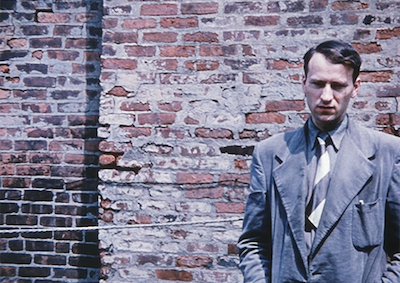The importance of Jonas Mekas (1922-2019) to the world of American independent and experimental film cannot be overestimated. Reaching the United States after World War II with his brother Adolfas, Mekas would, over the next 70 years, become a critical figure in exhibiting, distributing, and reviewing experimental films, organizing the New York scene, and by extension, establishing the society in which avant-garde film culture is created and appreciated to this day. His death earlier this year at age 96, shortly after completing two books for publication, marked the end of a generation, especially as it was so shortly followed by the deaths of Barbara Hammer and Carolee Schneemann.
Over the course of decades, while also being co-founder of the distributor Film-makers’ Cooperative, founder of Anthology Film Archives, film reviewer for The Village Voice, editor of Film Culture, poet, filmmaker, and more, Mekas made a larger number of films, mostly in a diary vein. Overall he called his films “Diaries, Notes and Sketches.” Tonight’s tribute includes three examples, Williamsburg, Brooklyn, a more recent video piece that also includes some of his earliest footage from the 1950s; reel one of Walden, which also includes the short film Notes on the Circus and Cassis, and his feature film Reminiscences of a Journey to Lithuania
Los Angeles Filmforum members receive free admission at the box office!
Jonas Mekas in Kodachrome Days (2009)
"Jonas remains most famous for not acting famous. Here he can be seen away from film audiences, dawdling in the cosmos while history happens elsewhere (unless we are mistaken, and the most meaningful and revealing moments are the moments at ease)."—Ken Jacobs
Digital film, color, silent, 4 min. Director: Ken Jacobs.
Williamsburg, Brooklyn (2003)
A pocket-sized city symphony, Williamsburg, Brooklyn collects some of the first images Jonas Mekas shot with a film camera in 1950 (along with footage from 1972 when he was returning to his old neighborhood as a visitor). Bygone Brooklyn is richly evoked in the everyday life of the street: the elevated train, Lithuanian storefronts and especially in the faces of children surprised to encounter this man with a movie camera.—Max Goldberg
16mm, color and b&w, silent, 15 min. Director: Jonas Mekas.
Walden (Reel 1, 1969)
Filmed in 1964-68. Edited in 1968-69. Walden was Mekas' first diary film, and it was edited as a collection of images gathered between the years 1964 and 1969. Its original title was Diaries, Notes, Sketches, which was the intended name for all of his films (they would each have different subtitles), though when it became too confusing for film laboratories to distinguish between films, Mekas abandoned the practice. He still kept Diaries, Notes, Sketches as a subtitle in Walden, Lost Lost Lost, and In Between, and the name is often used to designate his entire film oeuvre. The sketches in Walden refer to various films that, edited previously, were later included in Walden: Report from Millbrook (1965/1966), Hare Krishna (1966), Notes on the Circus (1966), and Cassis (1966) all occur within the film. "New York in spring; Tony Conrad; Bibbie in Central Park; A Wedding; Breakfast in Marseilles; Cassis; Sitney leaves New Haven; Fire on 87th Street; Brakhage crosses Central Park; Carl Th. Dreyer; A trip to Millbrook; Flowers for Marie Menken; Gregory Markopolous shoots 'Galaxie'; Notes on the Circus."—Jonas Mekas
16mm, color, sound, 43 min. Director: Jonas Mekas.
Sebastian and Jonas Leaving the Party (2019)
"My last image of Jonas."—Ken Jacobs
Digital file, color, silent, 1 min. Director: Ken Jacobs.
Reminiscences of a Journey to Lithuania (1972)
“The film consists of three parts. The first part is made up of footage I shot with my first Bolex, during my first years in America, mostly from 1950-1953. It shows me and my brother Adolfas, how we looked in those days; miscellaneous footage of immigrants in Brooklyn, picnicking, dancing, singing; the streets of Williamsburg. The second part was shot in August 1971, in Lithuania. Almost all of the footage comes from Semeniskiai, the village I was born in. You see the old house, my mother (born 1887), all the brothers, goofing, celebrating our homecoming. You don't really see how Lithuania is today: you see it only through the memories of a Displaced Person back home for the first time in twenty-five years. The third part begins with a parenthesis in Elmshorn, a suburb of Manburg, where we spent a year in a forced labor camp during the war. After the parenthesis closes, we are in Vienna where we see some of my best friends - Peter Kubelka, Hermann Nitsch, Annette Michelson, Ken Jacobs. The film ends with the burning of the Vienna fruit market, August, 1971.”—Jonas Mekas
16mm, color, sound, 82 min. Director: Jonas Mekas.






 Mobile Navigation
Mobile Navigation

